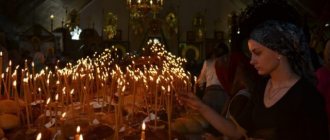A church choir is called a choir; this word is also used to describe the place where the choir stands in a church. Those people who often visit an Orthodox church know that the basis of the service is church singing. One can hardly imagine any church service without it. A lot depends on singing in church; poor singing disrupts prayer and makes you distracted. Too pretentious “operatic” singing also distracts from prayer. Correct singing in church should humble a person and put him in the right prayerful mood. That is why priests attach such importance to the selection of singers.
A little history
Singing in church appeared in the first centuries of Christianity. At first, in churches there was no division between those who prayed and those who sang; everyone present sang during the service. This emphasized the unity of prayer, the unified spirit. Gradually, a division occurred; several believers formed a church choir, which began to be called the choir. This word is translated from Greek as “part of the earth.” Those. Initially, this word only referred to the place where the singers stood. Usually this was some kind of elevation near the altar. Later this place became known as soleya.
Then the word “kliros” began to be used to describe the church choir . After the division into Orthodoxy and Catholicism, a significant difference in the manner of church singing became noticeable. Znamenny, hook singing prevailed in Orthodoxy. And in Catholicism - chorales, which were performed to the accompaniment of a musical instrument, usually an organ.
In Russia, during the reign of Peter the Great, the Znamenny chant, in which the choir sang a melody in unison, was replaced by the partes chant. The musical theme was divided into parts, hence the name.
There were usually four parties:
- soprano;
- alto;
- tenor;
- bass.
This was an innovation and was not immediately accepted in the church environment. Gradually the Znamenny singing faded away.
Antiphonal singing gradually appeared: two choirs sang in turns. Then the canonarchs appeared - readers who proclaimed the line, and the choir repeated it. This is how the stichera sang. The leader of the choir began to be called a “regent” or “shepherd attendant.”
Reading the Gospel:
Gospel of Luke, chapter 15, verses 11 - 32
Read excerpt
11 He also said, “A certain man had two sons; 12 And the youngest of them said to his father: “Father! give me the next portion of the estate.” And the father divided the estate for them. 13 And after a few days the younger son, having gathered everything, went to a far side and there squandered his substance, living dissolutely. 14 And when he had spent all his time, there came a great famine in that country, and he began to be in need; 15 And he went and accosted one of the inhabitants of that country, and he sent him into his fields to feed pigs; 16 And he was glad to fill his belly with the horns that the swine ate, but no one gave it to him. 17 When he came to his senses, he said, “How many of my father’s hired servants have bread to spare, but I am dying of hunger; 18 I will get up and go to my father and say to him: Father! I have sinned against heaven and before you 19 and am no longer worthy to be called your son; accept me as one of your hired servants." 20 He got up and went to his father. And while he was still far away, his father saw him and had compassion; and, running, fell on his neck and kissed him. 21 The son said to him: “Father! I have sinned against heaven and before you and am no longer worthy to be called your son.” 22 And the father said to his servants, “Bring him the best robe and dress him, and put a ring on his hand and sandals on his feet; 23 And bring the fatted calf, and kill it; Let's eat and have fun! 24 For this son of mine was dead and is alive again; he was lost and is found.” And they started having fun. 25 And his eldest son was in the field; and returning, when he approached the house, he heard singing and rejoicing; 26 And calling one of the servants, he asked, “What is this?” 27 He said to him, “Your brother has come, and your father killed the fatted calf, because he received it healthy.” 28 He became angry and did not want to go in. His father came out and called him. 29 But he answered his father: “Behold, I have served you for so many years and never violated your command, but you never gave me even a kid so that I could have fun with my friends; 30 And when this son of yours, who had wasted his wealth with harlots, came, you killed the fatted calf for him.” 31 He said to him: “My son! You are always with me, and all that is mine is yours, 32 and in this we had to rejoice and be glad, because this brother of yours was dead and is alive again, he was lost and is found.”
Collapse
Priest Stefan (Domuschi) comments
Priest Pavel (Velikanov) comments
Read also the parable of the Prodigal Son as retold for children in our material .
Contemporary singing
Currently, the church choir stands either on the sole (a raised platform near the pulpit) or on top, a special building that is located on the second floor. From above, the sound becomes better, the sound is more spacious, especially in high stone churches where the acoustics are good.
In modern churches you can most often hear partes singing and everyday life. Sometimes the works of composers are sung, although some abbots believe that such chants should only be sung in a concert hall, but not in a church.
Znamenny singing, oddly enough, can be heard more and more often in modern churches. Priests believe that such singing is stricter and more prayerful. Although it is more difficult and requires perfect pitch and good singing skills.
Antiphons can also be found in our churches. Two choir members take turns singing stichera or beatitudes, or psalms. Canonry is also common, this is how prokeemnas are now performed.
Orthodox Life
On the third Week after Easter, the Orthodox Church celebrates the day of the Holy Myrrh-Bearing Women (this year on April 30). On the eve of the holiday, the editors of the Cathedral List offered to answer questions about church singing for women who serve in the choir in the St. Andrew-Vladimir Church at the Resurrection Cathedral of the UOC. We bring to your attention a conversation with the choir director Elena Savchuk and charter director Olga Starshevskaya.
– What, in your opinion, is the role of women in the Church, including in the choir?
ELENA: In order to answer this question, you need to look at the best female representatives in church history. The highest, most perfect peak for each of us can be the example of the Virgin Mary - Queen of Heaven and Earth. Her life, on the one hand, is an unattainable ideal, and on the other, an example to all of us of whom to follow and according to what pattern to straighten our lives. First of all, she is a Mother who has dedicated herself to the service of the Divine Son. Intercessor for the human race. The organizer of monastic monasteries and a caring Mother Superior. Mount Athos is the only place in the world where an earthly woman is forbidden to set foot.
OLGA: In the Epistle to the Galatians (3:28) it is said: “...There is neither male nor female: for you are all one in Christ Jesus.” Each of us has our own ministry. There is a priestly ministry - available only to men, and no one in their right mind and strong memory will challenge this right. There is maternal ministry - the highest female ministry, inaccessible to men.
Our regent Elena is first and foremost a mother. Mother of three wonderful sons. Her maternal nature also dominates the choir. She knows how to win over a person, console him and give practical advice when he needs it.
ELENA: In our choir, the priest’s daughter (Angelina Stepanova), the priest’s wife (Larisa Koshuba, mother of three children), the wife of Deacon Pavel (Maria Filipovich), the sextons’ wives, and brides sing. All of them are in different statuses, but are united by one thing - the joy of participating in worship.
Many women are engaged in educational work in the Church - they conduct Sunday schools, charity work, decorate churches, trim, wash priestly vestments, prepare food, paint icons. In our church, the elder is also a woman (Lydia Palatnaya). It’s easier to say what women don’t do in the temple.
– Not everyone knows about the responsibilities of the choir. Please tell us who the church steward is and what is your task?
OLGA: The duties of the charterer are to monitor the order of church services, so that they are performed in accordance with the Church Charter. The guide monitors the readers on the choir so that there are no mistakes, so that everything sounds reverent and clear. As a guide, I prepare kathismas, troparia, kontakia and other readings of the day in advance. My responsibilities also include coordinating liturgical nuances and other statutory issues with the hierarchy. There should be no hiccups or errors during the service itself.
– What knowledge does a charterer need to have?
OLGA: You need to have a good understanding of the Church Charter. You also need to know the Church Slavonic language well and be a bit of a psychologist. Well, and, of course, a lot of knowledge comes with experience.
– Where did you learn this business?
OLGA: I graduated from the full-time department of the Chernigov Theological School and received the education of a regent-psalm-reader. It just implies, among other things, knowledge of the Church Charter.
– The service of the charterer, unlike the regent, does not have a creative beginning, but only a mechanical, precise adherence to the patterns of worship. Is it possible to say that the director is the brain of the choir, and the director is its soul?
OLGA: The duties of the charter extend a little further than the choir. The guide is like the master of ceremonies in the choir: he knows when and what to sing, when and what to read, when to be silent, when to kneel and much more. The good thing is that Elena is an experienced regent and knows the course of the service, and my task is slightly easier. The director coordinates many points during the service with the altar. Rather, the regent and I are two wings.
– There is an eternal dispute about what kind of music should be played in the temple. Some people say that you need to sing “simply and prayerfully,” while some people find the “concert” versions of the works more to their liking. There are even confessions of hatred for partes (a style of polyphonic church singing). Where is the line?
– The key word in your question is “hatred.” A priori, it should not be present in any disputes among Christians, much less in discussions of this kind.
Rev. Lavrentiy of Chernigov directed the choir from the age of 14. He wrote partes works, which were performed during worship services during his lifetime and were inherited by us.
If a composer uses his creative gift to glorify the greatness of the Creator, and not himself in a liturgical text, then this is always felt. In addition, you can sing simple prayer works in a pretentious and pretentious manner, or you can perform a concert piece in such a way that “your soul will fly to heaven.”
Znamenny chant is wonderful - it collects thoughts and feelings and, as it were, “drives” you into prayer, but you need to have high performing skills in order to maintain this prayerful state in those praying, because if even the slightest falsehood appears, then such a performance is impossible to withstand. I know from experience - my friends have long recognized the exclusivity of Znamenny singing. And I made this discovery while attending the Liturgy in the church where they serve.
When you don't pay attention to the inner person, energy is redirected to external stimuli. For some, icons should be painted exclusively in the canon, for others, iconostasis should be only made of wood, without any curls or gold, and someone passionately hates partes...
In my opinion, everything that is approved by our Holy Church can be sung with a calm soul, the main thing is not to lose peace of mind. Our God is the God of Love. He sees in what state we are performing, be it a Znamenny chant, a concert piece or a partes.
– Judging by your experience, is there any point in further reducing services in parish churches or is reading long kathismas necessary?
OLGA: The question already conceals your attitude towards kathismas - “long”... One kathisma takes 10 minutes, the longest 15. At our All-Night Vigil, 2 kathismas are read out of the required three according to the Charter. I read, I don’t remember which of the holy fathers, that a Christian at the end of his life will remember not how much he fussed and how many things he redid, but the grace-filled moments of joint prayer with people close in spirit. This will prove to be man's most precious possession. Prayer moves mountains.
It may be objected to me that 3 hours of prayer (speaking of the All-Night Vigil) and one and a half to two hours of Liturgy is insanely long. But let's look from the other side. There are 168 hours in a week. If a person prays morning and evening with the usual prayer rule (half an hour a day), that’s another 6.5 hours. Total: we try to devote 11 hours a week to communicating with the Creator. With the One who loves us immensely. This is less than a tenth of the weekly “limit”. And we feel sorry for this time too.
It would seem that high technologies make our lives easier; we can contact another continent in a split second, get home by subway, car or plane tens or even hundreds of times faster than was available to our predecessors. Find any information in a matter of minutes, pay for utilities without leaving home, washing, partially cooking are automated... Our forefathers did not even dare to dream about such living conditions. How much TIME is freed up for the MAIN THINGS! For self-improvement and communication with the Creator! But the paradox is that these same technologies take away our precious life time. Everyone says that time is shrinking catastrophically, but few people admit to themselves that after work they can spend 5 hours on social networks or chat with a girlfriend/boyfriend for 2 hours. I don’t argue, there are a lot of really busy people. Life poses its own challenges to everyone, sometimes difficult to solve. Bring them to God. He will help, send assistants. Many people notice how after the service their soul becomes light and joyful. Because the Church is the House of God and the soul has come home, to where it is always expected and loved. During the service, the Lord Himself serves us, Communing with His Body and Blood, cleansing our souls and bodies, strengthening us in such a difficult time.
I can only add that I agree with the opinion of Priest Andrei Chizhenko, who in his article “Is it possible to shorten services” by Fr.
From my own experience, I would like to say that parishes where statutory services are omitted or shortened somehow become weaker and impoverished. Where parishioners, led by a priest, strive for this ideal - the Typikon - in their worship, there is growth and prosperity. An example of this is monasteries. In Rus' they have always been not only models of spiritual life, but also of economic management. Why? Everyday worship takes place there, calling on God's grace. And the Lord looks upon the faithfulness of his own.
– I came across such a concept on the Internet as choir ethics. What is this?
ELENA: First of all, a polite and respectful attitude towards the priesthood, the regent, each member of the choir, church workers and parishioners. Dress neatly and appropriately for the location. You need to come to the service early to catch your breath, watch the repertoire and tune in.
During the service on the choir, only the regent (indicating the choristers what needs to be sung) and the charter director (helping the regent and the readers to find their way at one point or another during the service, and also making comments to the readers when they make mistakes when reading) have the right to talk. Conversations that are not relevant, calls on a mobile phone, walking around for no reason, rustling, reading secular literature, newspapers, magazines and the like, not related to the service, are unacceptable. Unnecessary questions not related to the service to the regent or charterer are also inappropriate in the choir, because they can distract and disrupt the course of the service.
If a difficult situation arises, you must try to resolve it on your own and not take working matters outside the choir so as not to put any of the choir members in an awkward position. Everyone can make mistakes, you need to be able to be forgiving of your neighbor’s weaknesses and cover them with love; if that doesn’t work, try to learn how to do this.
OLGA: As a charter manager, I had to face the dilemma of to what extent to maintain subordination. After all, there is a Charter and there is a hierarchy. It happens that something needs to be agreed upon, settled, and sometimes even suggested. How to act in such cases so as not to cross the line and not engage in arbitrariness, on the one hand, and, on the other hand, people-pleasing in opposition to the Charter? This dilemma was resolved for me by the dean of the Andrei-Vladimir Church, Archpriest Pavel Bely. To my question, he answered: you need to act according to the Charter, if something is not clear or if something needs to be suggested, do not be embarrassed, but fulfill your obedience.
Well, and, of course, outside the choir and church, the singer should not forget where he serves, and not give rise to condemnation by his unworthy behavior. Remain yourself, do not be a hypocrite and do not pretend to be a saint, but understand that they look at you as a representative of the Church. And your behavior is either a sermon or an anti-preaching.
– What are the acoustics like in the St. Andrew-Vladimir Church? After all, this is not a domed temple, but a basilica.
- Excellent. In my opinion, the volume, dimensions and geometric shape of the surfaces, as well as the quality of the building materials, were correctly calculated in the temple. I don't know if the temple was acoustically plastered, but I personally like the sound. Even with a large crowd of parishioners, the voices of the choir and priesthood sound loud and clear. Of course, the acoustic sound of the temple also helps with this.
– The choir in the St. Andrew-Vladimir Church is located on the balconies. Does this make any difference? Are there any difficulties in communicating with the priests at the altar?
– The location of the choir is of great importance. The sound coming from above does not get bogged down below, especially if there are many worshipers in the temple, but, having risen upward, reflected from the ceiling surfaces, walls, windows and columns, it comes down transformed and beautiful.
Our communication is also well established. On the choir and in the altar there are telephones - a military radio (it was delivered to us by Archpriest Sergius Dermenzhi), and if necessary, we communicate and coordinate all the nuances of the service.
– What has changed the most in St. Andrew’s Church in recent years: the church itself, the parish, the atmosphere, or something else?
– For me personally, most of all, of course, the atmosphere has changed. From aloof and official, it gradually grew into a warm and family-like one. I repeat: this is my personal feeling. Well, and, of course, the arrival has increased significantly.
– How did you come to the profession of regent?
ELENA: My grandfather on my father’s side was the conductor of the military orchestra of the Kyiv Military District, and everyone in the family, except my dad (he is a lawyer), was associated with music. And my mother is also a music worker, so you can say that I am a hereditary musician. At one time I graduated from the music department of the Grinchenko College and in my first specialty I am a music and singing teacher. Then the Tax Academy, Faculty of Law, taught legal disciplines at various universities. My life was prosperous and fulfilled in the eyes of the people around me. Of course: family, home – full, children, prestigious job. But my soul languished and searched for meaning in all this. My search and life circumstances led me to the temple. Somehow I immediately got into the choir and pretty soon began to direct the choir. My grandfather's tuning fork came in handy - it was passed down to me by inheritance.
-What is a regent? Is it the conductor or something more?
ELENA: I think it's something more. Secular choirs, as a rule, entertain the public and fill leisure time, while church choirs, on behalf of those praying in the church, offer prayers to God and help them.
If a talented conductor of a secular choir puts his soul, strength, and emotions into every performance of choral works, then the regent, doing the same, strives first of all to convey the prayer and tune the choir to the appropriate wave.
If the director and choir do not understand what they are saying, to whom they are singing, but simply perform the works beautifully and harmoniously, the worshipers will have the feeling of a concert hall, not a church. The regent prays, the choir prays, and the parishioners pray too.
– What are the functions and responsibilities of the regent?
ELENA: Create a choir: select voices, divide them into parts; think over and learn the repertoire: this implies knowledge of voice chants, znamenny, pillar chants, travel chants of their structure, and, of course, partes works; know in what time period and what works are performed; select a repertoire for each service; know the rites of worship; be able to navigate liturgical texts. Regarding the first point “Create a choir”. In my 20 years as a regent, I have never looked for singers. They themselves came and are coming, or rather, the Lord brought them and is bringing them. It is impossible not to see this. There were always as many singers as needed - no more and no less. And these are always amazing people with amazing destinies. A choir is a living organism that lives its own life, one might say, a spiritual family, here spiritual relationships with people are born and often the Lord connects people for many, many years.
– Please tell us about the formation of your choir.
ELENA: The ideological and spiritual inspirer of the creation of the choir was Bishop Barsanuphius, at that time he was the archimandrite and treasurer of the Kiev Pechersk Lavra. At the end of 2003, I went to work at KPL in the supply department, being the regent of the temple in honor of the “Pochaev Icon of the Mother of God” in Okhmatdyt. Bishop Barsanuphius, having learned that I was the regent, proposed creating a choir for the Lavra church under construction in honor of the icon of the Mother of God “Joy of All Who Sorrow.”
At the request of the bishop and with the blessing of the governor of the Kiev Pechersk Lavra, the choir of the temple “Joy of All Who Sorrow” was created. During the years of service in the Lavra, we sang in the Assumption, Refectory, Trinity Gate, All Saints Gate, Life-Giving and Anno-Conception churches. We concelebrated quite often with Archimandrite Barsanuphius. When he was consecrated Bishop of Borodyansky and given a new obedience - the keymaster of the Cathedral under construction - then, after the consecration of the St. Andrew-Vladimir Church, he invited our choir.
– Introduce your choir members.
ELENA: Olga Starshevskaya is my assistant, deputy regent, charter director. Graduated from Chernigov Theological School. In the past, he was regent of St. Nicholas Cathedral in Kotovsk. Therefore, we understand each other well, as the regent of the regent. Olga replaces me when I am absent. She came to the choir in 2005 with the blessing of Bishop Barsanuphius. He also works as a director at the Kiev Pechersk Lavra recording studio.
I would like to note that all of our choristers have a musical education, but also have secular professions.
Yulia Bogachuk – second alto. A competent and gifted singer and reader. Violinist. By education, she is a primary school teacher and child psychologist. Graduated from Kiev University named after N.P. Drahomanov. Works in the publishing department of the Cathedral.
Lyudmila Masterova – second alto. An old-timer - he has been singing in the choir since the first days of its creation. Employee of the pilgrimage department of the Kiev Pechersk Lavra.
Oleg Petrov – baritone tenor. Graduated from the Kyiv Polytechnic Institute. Businessman. Composer, musician, arranger. Father of many children.
Maxim Krivonos - bass. Student at the Glier Music College. Music teacher.
Elena Molchanova – alto. She graduated from the Belarusian State Academy of Music and the Minsk Theological School, and was trained as a regent and a bell-ringer. She participated in the international ringing festival “Crystal Bells” (Kargopol, Arkhangelsk region), in the ringing competition, and for 4 years she was a participant in the Moscow Easter Festival. Music teacher.
Angelina Stepanova – soprano. From the age of six, I spent the entire summer in a convent in honor of the Volyn Icon of the Mother of God (in the Rivne diocese). There I learned to read Church Slavonic (I read the psalter and evening rules in church and sang in the choir). Student at the Kyiv College of Construction, Architecture and Design. He draws beautifully.
Anna Isakova – alto. My classmate at the school named after. Grinchenko. Police Major. Patrol police inspector. Graduated from the Kyiv Police Academy. She loves church singing so much that sometimes she rushes to the service from patrol without changing clothes. Graduated from the Kyiv Police Academy, Faculty of Law.
Liliya Voloshina – soprano. She graduated from regency courses at the Kyiv Theological Academy and Seminary. Student at Nizhyn State University named after N.V. Gogol (Faculty of Foreign Languages).
Marina Medvedeva – soprano. Graduated from the Kiev National Linguistic University, majoring in philology (Chinese language). Works in a bank, lawyer.
Svetlana Tsedik – soprano. Studying at KNU named after. T. G. Shevchenko, Institute of Philology, Faculty of Folklore, Ukrainian language and literature, foreign language. This year he graduates from regency courses at the Kiev Pechersk Lavra.
Natalya Nikolabai – soprano. Pianist, vocalist. Graduated from the University. T. G. Shevchenko. Political scientist. English teacher.
Maria Filipovich – soprano. Graduated from Gorodotskoye Theological School. Regent-Psalmist.
On major holidays, Mother Larisa Kashuba (wife of Archpriest Oleg Kashuba) sings with us. Born into a priest's family. Regent of the Holy Intercession Cathedral in Smela, Cherkasy region. She graduated from medical school and studied church literacy on her own.
– What are the principles for selecting the repertoire?
– Works must be written in the same style. You cannot combine a complex polyphonic work with a single-voice Znamenny chant. There is no need to over-simplify or over-modernize the repertoire. Exclude from the liturgical repertoire musical works of a concert rather than church nature, various kinds of choral experiments that do not help, but hinder prayer and worship.
– To what extent should one rely on the taste of the abbot in selecting the repertoire?
– Fortunately for me, I did not know such problems with the rectors of the churches in which I served. It happens that priests will come up and ask you to perform a specific piece that they like. Why not fulfill this request? I don't see a problem.
– An ideal regent, an ideal choirmaster – what should they be like?
- “Ideal”? Only the Lord is perfect. You can fantasize a lot, but life experience shows that there are no ideal people. Because each of us carries our own sorrows and infirmities, and it is impossible to approach a specific person with a template of ideality. Ideally, the main thing should be: LOVE. And if there is love in the choir, then condescension towards the infirmities of one’s neighbor will appear, mistakes and shortcomings will be covered, there will be strength to endure shortcomings, character traits, because love covers everything.
– Do you remember anything special during your regency service?
– The most striking event, without exaggeration, was the meeting with Bishop Barsanuphius, through whom the Providence of God was realized in my life (serving in the Kiev Pechersk Lavra and in the St. Andrew-Vladimir Church). This may not sound too pompous, but everyone knows that the Lord works through people.
I remember how at Okhmatdyt we visited sick children in the oncology department and served a prayer service for the sick in front of the miraculous icon of the Mother of God. Of course, happiness comes from serving in the Lavra.
On Christmas Day, we once sang carols in chorus at His Beatitude Metropolitan Vladimir (Sabodan), at the head of the Lavra. The abundance of blessings and Christmas grace received at the service and spread throughout the holy Lavra monastery made one’s head spin. Happiness filled our hearts then. Today, everyday happiness comes from serving in St. Andrew's Church.
Interviewed by Andrey German
Dear sisters, we wish you prosperity, peace, harmony in your families, so that the warmth of the feelings of your loved ones towards you is sincere. May the Lord always be with you. We wish all mothers, sisters, young women and babies the intercession of the Most Holy Theotokos.
We wish you ardent love for God and your neighbor! Let those who experience your love appreciate it and return it to you a hundredfold with their love. Have a long and blessed summer!









